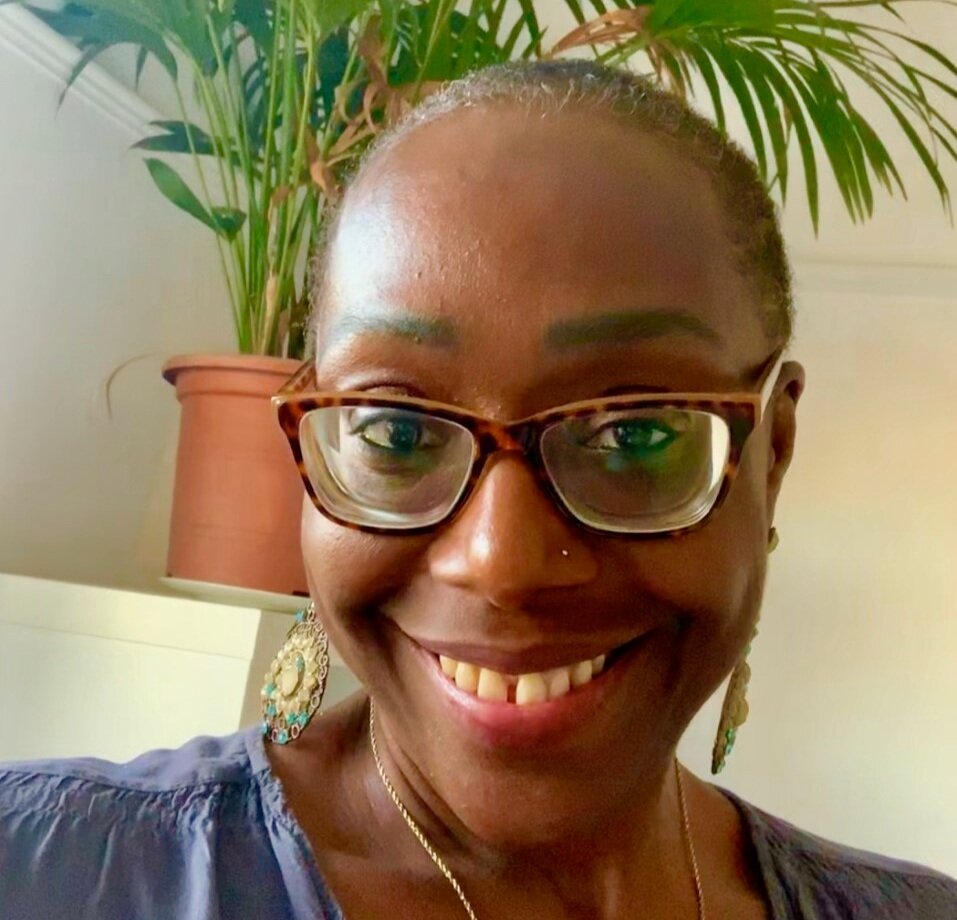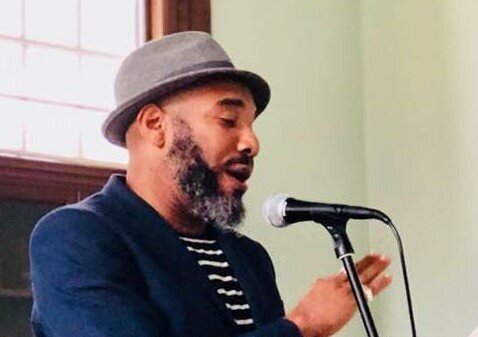Caribbean Nights: Poetry
Screened online 11 - 15 June 2020 in collaboration with the George Padmore Institute.
You can still watch responses to the Arena from contemporary activists and poets: the GPI’s Nicole-Rachelle Moore, Jacqueline Bishop, Hannah Lowe and Dorothea Smartt. Read and listen to new poems from award-winning poets Jay Bernard and Anthony Joseph and then try your hand at writing your local memoirs, with a masterclass from author Colin Grant.
YOUR LOCAL ARENA: RESPONDING TO Caribbean Nights: Poetry
Jacqueline Bishop is an award-winning writer and visual artist born and raised in Jamaica, who now lives between London and New York City. She has twice been awarded Fulbright Fellowships, including a year-long grant to Morocco; her work exhibits widely in North America, Europe and North Africa. Bishop's books include a novel, The River’s Song (2007), two collections of poems, Fauna (2006) and Snapshots from Istanbul (2009), a 2007 art book entitled Writers Who Paint, Painters Who Write: 3 Three Jamaican Artists, and The Gymnast and Other Positions (2015), a collection of short stories, essays and interviews. The Gymnast and Other Positions won the nonfiction category of the 2016 OCM Bocas Prize for Caribbean Literature. The Gift of Music and Song: Interviews with Jamaican Women Writers is forthcoming.
Hannah Lowe is a writer and academic in London, UK. Her first poetry collection Chick (Bloodaxe, 2013) won the Michael Murphy Memorial Award for Best First Collection and was short-listed for the Forward, Aldeburgh and Seamus Heaney Best First Collection Prizes. Her second collection is Chan (Bloodaxe, 2016). In 2014, she was named as one of 20 Next Generation British poets, an accolade awarded once a decade. She has also published four chapbooks: The Hitcher (Rialto 2012); R x (sine wave peak, 2013); Ormonde (Hercules Editions 2014). (2016) and most recently, The Neighbourhood. (Outspoken Press, 2019). She has been Writer in Residence at Keats House and currently lectures in Creative Writing at Brunel University.
Nicole-Rachelle Moore is a Cultural Educational Consultant and coordinates the George Padmore Institute's events, outreach and publicity initiatives. She also works with the pioneering publishers New Beacon Books. She regularly consults on a range of cultural and educational issues at schools, colleges and other institutions. She is the Co-Editor of Dream to Change World: The Book of the Exhibition (2018) on the life and legacy of John La Rose. Her areas of research interest are Caribbean Studies and Postcolonial Cultures.
Dorothea Smartt was born and brought up in London and is of Barbadian heritage. She was Poet in Residence at Brixton Market and Attached Live Artist at the Institute of Contemporary Arts in London, where she was also awarded her first commission to create the collaborative performance from you to me to you. Her solo performance work, Medusa, combining poetry and visuals, was named an 'Outstanding Black Example' of British Live Art. In 2000 she was commissioned to write her first play, Fallout, which toured primary schools. Her first poetry collection, Connecting Medium (2001) explores her Barbadian heritage and her experience of growing up in London. Her second collection, Samboo's Grave/Bilal's Grave (2008) explores the history of Samboo, an African slave brought from the Caribbean to Lancaster and buried at Sunderland Point.
Caribbean Nights: Poetry NEW POETRY BY Jay Bernard and Anthony Joseph
Jay Bernard
‘Funny Word’
Anthony Joseph
‘Comets’
Commissioned Poets
Jay Bernard is from London and works as a writer and film programmer. They are the author of Surge (Chatto & Windus 2019), which came out of a 2016 residency at the George Padmore Institute. The collection explores the archives relating to the New Cross Fire of 1981 where fourteen young black people lost their lives. Surge has been shortlisted for the Forward, Costa, T S Eliot, Jhalak, Ondaatje and Dylan Thomas prizes. Jay was the winner of the 2017 Ted Hughes award for an early version of Surge performed at the Roundhouse in London, which was followed by a full run at the Albany in Deptford in 2019. Jay’s work has also been featured in numerous anthologies – TEN: The New Wave, Voice Recognition, Out of Bounds: Black British Writers and Place and Flicker and Spark: A Contemporary Queer Anthology – and they are the author of three chapbooks, Your Sign is Cuckoo Girl (2008), English Breakfast (2013) and The Red and Yellow Nothing (2016).
Anthony Joseph is a Trinidad-born poet, novelist, academic and musician who has been referred to as ‘the leader of the black avant garde in Britain’. As a musician and spoken word artist he has released seven critically acclaimed albums which blend Afro-Caribbean music, free jazz and funk. The most recent, People of the Sun (Heavenly Sweetness) was recorded in Trinidad and released in 2018. In the same year he curated ‘Windrush: A Celebration’, a series of five events which celebrated the literary and musical legacies of the Windrush generation, culminating in a gala concert at the Barbican as part of the London Jazz Festival. Joseph’s novel, Kitch, a biography of calypso icon Lord Kitchener, was shortlisted for the 2019 Republic of Consciousness Prize, the OCM Bocas Fiction Prize for Caribbean Literature, and the Royal Society of Literature’s Encore Award. In 2019 he was awarded a Jerwood Compton Poetry Fellowship. His latest novel, The Frequency of Magic, is just out.
WRITING YOUR MEMOIR: A MASTERCLASS
Life Writing
Colin Grant is an author, historian and Associate Fellow at the Centre for Caribbean Studies. His books include: Negro with a Hat: The Rise and Fall of Marcus Garvey and a group biography of the Wailers, I&I, The Natural Mystics. His memoir of growing up in a Caribbean family in 1970s Luton, Bageye at the Wheel, was shortlisted for the 2013 Pen/Ackerly Prize. Grant’s history of epilepsy, A Smell of Burning, was a Sunday Times Book of the Year in 2016. As a producer for the BBC, Grant wrote and directed several radio drama documentaries including African Man of Letters: The Life of Ignatius Sancho and A Fountain of Tears: The Murder of Federico Garcia Lorca. Grant also writes for a number of newspapers and journals including the Guardian, TLS and New York Review of Books. Grant’s latest book is Homecoming: Voices of the Windrush Generation.
CARIBBEAN NIGHTS: POETRY
With Derek Walcott, Linton Kwesi Johnson, Fred D’Aguiar and Darcus Howe in the studio and including C. L. R. James, Michael Smith and Kamau Brathwaite on film
Listen to Arena Editor Anthony Wall in conversation with Lucy Hannah, about the making of Caribbean Nights
Listen to George Padmore Institute Trustee Roxy Harris in conversation with Lucy Hannah.
Roxy Harris is a founder Trustee (1991) of the George Padmore Institute and is its current Chair. He was a member of The Black Parents' Movement, played a major part in the International Bookfair of Radical Black & Third World Books (1982-95), was a member of the New Cross Massacre Action Committee and for many years was a coordinator and teacher at the George Padmore Supplementary School. He has taught in secondary schools, further education colleges, adult education institutes and in universities. He has authored and edited numerous books and other publications.
In 1986, Caribbean culture was thin on the ground, to say the least, on British television. Caribbean Nights was Arena’s attempt to draw attention to what everyone was missing. It began with a five-hour themed Saturday night on BBC Two, with films and discussions from all over the region and a different film each night over the following week, including the first feature documentary on Bob Marley. Here are a few words on its genesis.
We had developed a relationship with Linton Kwesi Johnson and Darcus Howe through two films we’d made together a few years previously. Arena: Brixton to Barbados was a documentary about Carifesta in Barbados in 1981, Linton wrote and presented it and I directed it.
The festival was an eye opener for me, its richness and variety were dazzling: Irakere from Cuba; The Renegades Steel Orchestra from Trinidad; Arrow from Montserrat; Rebirth, a stunning multicultural theatre company from Surinam; and, of course, the writers. Linton introduced me to many of them, including Mervyn Morris, Shake Keane and a young poet from Jamaica, Michael Smith.
Michael Smith was part of the new movement of dub poetry, as it became known, or reggae poetry, as Linton preferred to call it. Linton had pioneered the form in Britain, with Mutabaruka and Oku Onuora doing something similar in Jamaica. Michael was clearly an exceptional talent, his poetry was startlingly original, assured and performed with mesmerising power. For Brixton to Barbados he declaimed his already classic ‘Me Cyaan Believe It’.
The following year, he came to Britain and we made a film here. Arena: Upon Westminster Bridge provided the thematic basis for the poetry section of Caribbean Nights. C. L. R. James was living in Brixton at the top of the house of the Race Today Collective on the corner of Railton and, fortuitously, Shakespeare Roads. There C. L. R .would hold court and offer his inimitable knowledge and wisdom. He greatly admired Linton’s poetry and political stand but he was also renowned for his love of the classic works of English Literature. Michael made it clear those works said nothing positive to him. C. L. R. singled out Shelley and Keats and proposed that, while their literary language could not have been more different to that of the reggae poets, their revolutionary sentiments were identical. Michael was persuaded.
Upon Westminster Bridge, through Michael, C. L. R. and Linton, explores the correspondences and differences between historic English literature and this new poetry expressed in the language of reggae DJs and everyday Jamaican speech. That dialectic became the basis of the studio discussion, with Derek Walcott, who wholeheartedly embraced the grand literary tradition, Linton and the young Fred D’Aguiar. The result, judiciously supervised by Darcus, is a vibrant, passionate exchange of fiercely held convictions and beliefs and a demonstration of the unique, extraordinary breadth of Caribbean poetry.
Anthony Wall
6 May 2020
About the George Padmore Institute
Founded by John La Rose, the late Trinidadian activist, poet and trade unionist, the George Padmore Institute is an archive and educational research centre based in north London which houses unique archive collections relating to the political, social and cultural organisations of the UK’s black, Asian and minority ethnic communities over the last 70 years. Collections include archives from the UK’s first black bookshop and publisher New Beacon Books (founded in 1966 by John La Rose and Sarah White) and from the International Book Fairs of Radical Black and Third World Books (1982-95) among others. Selected publications include: Foundations of a Movement, ed. Roxy Harris & Sarah White (London: New Beacon Books, 1991); The Caribbean Artists' Movement 1966-1972: A Literary & Cultural History by Anne Walmsley (London: New Beacon Books, 1992); and A Meeting of the Continents: The International Book Fair of Radical Black and Third World Books 1982-95 – Revisited, ed. by Sarah White, Roxy Harris and Sharmilla Beezmohun (London: New Beacon Books/George Padmore Institute, 2005). See https://www.georgepadmoreinstitute.org/









